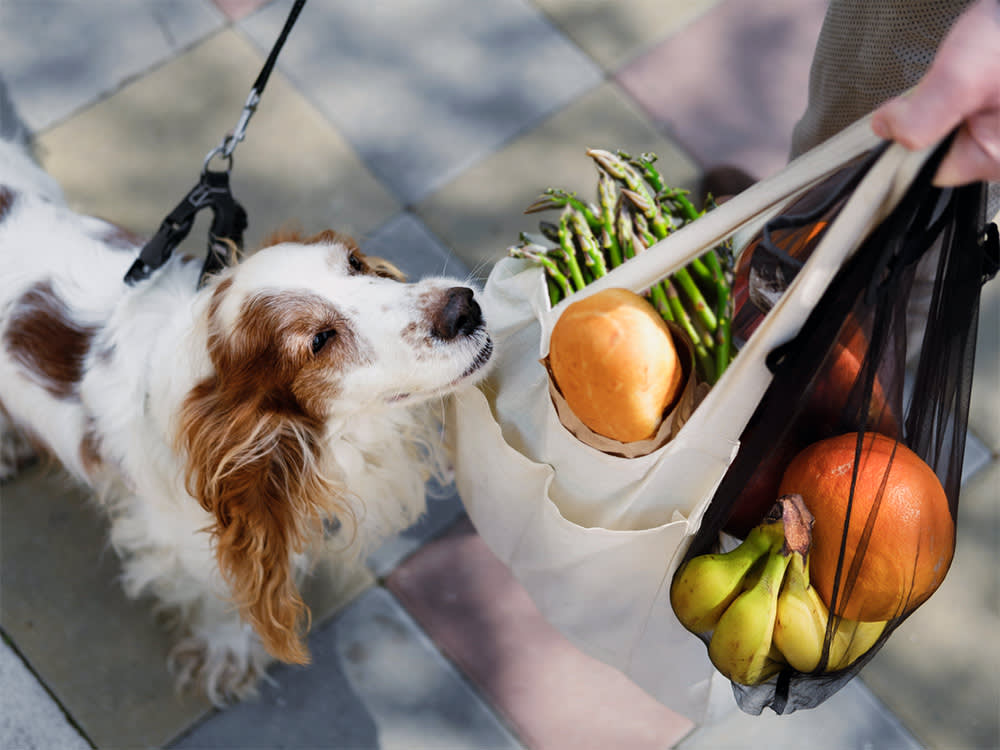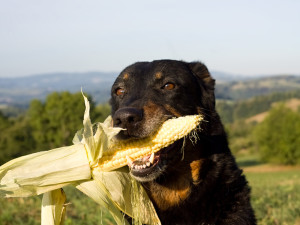Can Dogs Eat Asparagus?
Asparagus is a healthy snack for pups, but keep these tips in mind.

Share Article
Asparagus can make a great addition to dog diets, providing extra bulk to help them feel full without adding a lot of calories. Asparagus can also be added to many weight-loss diets as a flavorful treat.
Although asparagus should be a safe way to add some variety to your dog’s food, it’s important to talk to your veterinarian before making any diet changes to make sure there are no potential issues. Asparagus is generally considered a healthy food, but there are some situations where your vet may recommend against feeding it. As with all diet additives, it’s best to limit asparagus to just a small part of your dog’s overall intake.
Nutrition facts asparagus for dogs
Like celery, raw asparagus spears mostly consist of water, with 93 percent of their weight coming from water. This helps keep their calorie count low despite being a filling treat. Raw asparagus is very low in sodium, but canned versions have a lot of salt added. If you’re not able to feed raw or home-cooked asparagus, look for low-sodium varieties of canned products. This is especially important for dogs with heart problems, kidney disease, or high blood pressure.
Is asparagus good for dogs?
Asparagus contains a variety of antioxidants, vitamins, and minerals that can be great for dogs. Commercial dog foods are balanced to contain all the nutrients needed for a healthy life, but sometimes picky dogs just aren’t that interested in them. Adding asparagus can add some extra flair to a food that your dog finds kinda blah. Some of the reasons that asparagus is a go-to food topper or treat include:

Low calorie count: A cup of raw asparagus only has 27 calories, making the vegetable a great snack for overweight dogs.
High in vitamin K: Asparagus contains a healthy portion of vitamin K, which is used in blood clotting and bone health.
High in fiber: Fiber helps to feed the good gut bacteria and can improve stool consistency.
Water content: Asparagus’ water content provides a little extra hydration and makes dogs feel full more quickly, which is great for chowhounds who need to watch their weight.
Can dogs eat asparagus stems?
Many dog parents may be tempted to toss the cut stems of asparagus to their dogs to munch on. While the stems are not toxic, most are very dry and woody. If chewed poorly, these can get stuck in the esophagus more easily than the more edible parts of the spear. They will also digest more poorly due to their dryness and fibrous consistency. It’s best to just toss them in the trash and share the tender parts of the veggie with your pup. They deserve the good stuff.
Is asparagus completely safe for dogs?
Raw, boiled, and steamed asparagus are generally very safe, provided your dog is not allergic to the vegetable. Avoid sharing asparagus cooked in oil or butter to help prevent stomach upset. Canned asparagus can be high in sodium, so avoid it if your pup has health problems that call for sodium restriction like heart disease, kidney disease, or high blood pressure.
Asparagus contains a moderate amount of oxalates. These substances are commonly found in plants and may play a role in disease prevention. But some dogs are predisposed to forming bladder or kidney stones when oxalates combine with calcium in their body. Due to their moderate oxalate content, your veterinarian may recommend avoiding asparagus if your dog has a history of calcium oxalate crystals in their urine or stones in their bladder or kidneys.
There’s also a little confusion out there about the safety of asparagus for dogs due to the asparagus fern. Despite the similar name, the asparagus fern (Asparagus densiflorus) is a distinct plant from the asparagus (Asparagus officinalis) you see in the store. If eaten, asparagus fern can cause stomach upset in dogs. This is not a worry for the asparagus spears your dog gets excited for.
The bottom line: Can dogs eat human food?
Pet parents can share many human foods with their dogs. There are a few key things to remember before inviting your pup to share your dinner, though:
Check to make sure that no ingredients are toxic to dogs. It’s easy to forget about the onions, garlic, or chives you added for flavor, but those can all cause problems for them.
Don’t overfeed. Treats, table scraps, and supplements should make up less than 10 percent of your dog’s daily calories. Your vet can help you figure out how much they should be eating and what treats are acceptable.
Keep things as plain as possible. While you may appreciate a lot of butter and spice in your food, your dog’s stomach does not. Reduce the chances of stomach upset by feeding bland ingredients.
Avoid feeding raw meat. Consuming raw meat increases the risk of contracting dangerous pathogens like Salmonella and E. coli that can infect them and spread to people in the house.
Other veggies that are safe for dogs
You can share some of these plain veggies with your dog as a snack or treat — in limited quantities, of course.
Corn: Your dog can have some corn kernels or plain popcorn, but never give them a corn cob to chew on. Those are notorious for causing intestinal obstructions in dogs and usually require surgery to get out.
Broccoli: Similar to asparagus, broccoli is high in fiber and Vitamin K. While some dogs are put off by the fluffy florets, most enjoy crunching on broccoli stems.
Sweet potatoes: Cooked sweet potatoes are calorie-dense, so keep offerings of this delicious tuber small.
Other foods that are dangerous for dogs
Onions: Along with its siblings garlic, leek, and chives, onions can be deadly for dogs. Onion powder, often found in soups and dips, is particularly dangerous because it is so concentrated.
Grapes: Grapes seem like a perfect bite-sized snack for dogs, but they can contain a chemical that causes acute kidney failure. Avoid grapes and raisins like the plague.
Avocado: Although a small amount of avocado flesh isn’t dangerous for dogs like it is for some other animals, there are better treats for dogs. Avoid this fatty snack and find something healthier to share.
FAQs (People also ask):
How much asparagus can a dog eat?
Food additives and snacks like asparagus should be kept to less than 10 percent of your dog’s daily calories. Your vet can help you figure out how much is safe: obviously, a Great Dane can get more than a Chihuahua.
Is it OK to give dogs asparagus?
Dogs can have asparagus in limited amounts as long as they don’t have any health conditions making it a bad idea. Asparagus can be a healthy treat for most dogs.
Why do dogs like asparagus?
Dogs seem to love crunching on things, and flavorful vegetables are no exception. Asparagus seems to be a particular favorite of many dogs.
Is asparagus safe for dogs?
Asparagus is non-toxic to dogs and can be added as a treat or small snack safely for most dogs. Always check with your veterinarian before adding any new foods to your dog’s diet.
References:

Dr. Bartley Harrison, DVM
Dr. Bartley Harrison is a veterinarian with more than 19 years of experience. He has treated a variety of species in emergency and speciality practices for both large and small animals. His primary interests as a vet are emergency medicine and critical care.
Related articles
Can Dogs Eat Mashed Potatoes?
It might be comfort food for you, but not for your pup.
Can Dogs Eat Corn?
A few kernels are fine—but keep it off the cob.
![brown puppy eating food out of green bowl]()
A Digestible Guide to Healthy Dog Food for Your New Pup
How to pick the right grub for your dog when there are So. Many. Choices.
![Feeding raw salmon or sashimi to young French bulldog]()
10 Healthy “People” Foods for Dogs
You might be surprised that these common health foods are totally safe for pups.
![A person giving a banana to a dog.]()
10 Fruits and Vegetables That Your Dog Can Feast On
Indulge your pup (safely) with these delicious and healthy snacks.
![Women in the kitchen baking mushroom pizza with her dog.]()
Can Dogs Eat Mushrooms?
Your dog is a fun-gi, but be careful which shrooms they eat.








